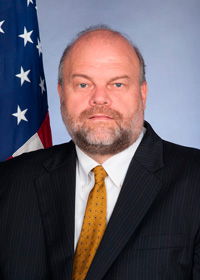Venezuelan envoy blames US for stoking fire
JORGE Alfonzo Guerrero Veloz, the Venezuelan Ambassador to Grenada, is accusing the United States of fueling the ongoing territorial controversy between Guyana and Venezuela.

He made the ridiculous claim last Friday at a press briefing in Grenada, which was widely broadcast by Grenada’s MTV News, even on social media.
Asked to specify who the third party was he claims was responsible for fueling the controversy, Veloz said without faltering that it was the United Stetes to which he was referring.
He gave as his reason for blaming the US for the further souring of relations between the two neighbouring South American countries its declaration in March of this year that Venezuela is a threat to its national security. The declaration at reference is an executive order issued and signed by US President Barack Obama, which, in addition to calling Venezuela a national security threat, ordered sanctions against seven Venezuelan officials in what is widely believed to be “the worst bilateral diplomatic dispute” since President Nicolas Maduro took office in 2013.

Another reason for saying what he did, Veloz said, is the fact that ExxonMobil, the company currently drilling for oil in Guyanese waters and responsible for raising up all this bad blood between Guyana and Venezuela, is American.
In early May, ExxonMobil announced out of the blue that it had found significant deposits of oil in the Stabroek Bloc, located 120 miles offshore Guyana.
As if that was not bad enough, the thing that perhaps nettled Venezuela the most was the actual arrival of ExxonMobil’s Deepwater Champion oil drilling rig.
It’s an assumption that Veloz vehemently denies. As he told Grenadian reporters Friday, “Nobody can guarantee that there is oil as they [ExxonMobil] says there is.” He bases his argument on the fact that oil explorations can take a number of years to determine whether there is oil or not.
Though acknowledging that the controversy goes back to the 1800s during the Spanish and British rule of South American countries, Veloz failed to reference the 1899 Tribunal Award, which granted most of the land at the centre of the controversy, what Guyanese know as the County of Essequibo, to Guyana.
Rather, he is insinuating that Guyana’s continued exploitation of the Essequibo territory is a contravention of Geneva Agreement of 1966. In so doing, he conveniently fails to say how it is that it is ExxonMobil’s activity, and not Guyana, that violates the Geneva Agreement.
“Guyana has no documents as owners of the land,” he said. “We believe that it is an aggression with a third party; that is their trans-national, ExxonMobil, that is behind the manipulating,” Veloz told reporters at the press conference Friday.
He even boasted how Guyana was able forv ten years, to benefit from the PetroCaribe deal, which, to him, is a clear indication that Venezuela bears no ill will against Guyana. “Venezuela has no intention of attacking or taking anything away from Guyana,” he said.
However, in July, following a visit to Venezuela by Finance Minister Winston Jordan, it was revealed that Venezuela had indicated, in no uncertain terms, that the country will no longer be interested in renewing the oil-for-rice barter under the PetroCaribe agreement, which comes to an end on November 16. This, too, Veloz conveniently forgot to mention during the course of his press conference.
Since the escalation of this controversy, which was revived by the Maduro administration, Guyana’s President David Granger has garnered the support of regional bodies, including the Caribbean Community (CARICOM), Union of South American Nations (UNUSUR), the Commonwealth of Nations and the Organisation of American States (OAS) against the aggressions from Venezuela.
Even newly accredited U.S Ambassador to Guyana, Perry Holloway has weighed in on the issue, saying that the two countries should push for “a peaceful resolution, continued dialogue and respect for international law.”
Prior to this official appointment, too, Holloway had told the Foreign Relations Committee of the U.S. Senate that any country making claims to territory must respect the rule of the sea and international obligations which govern same.
Holloway had further disclosed that the U.S. remains committed to encouraging both countries to reach a “peaceful resolution.”




.jpg)









